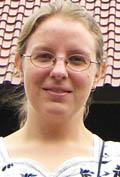
|
Kalissa Alexeyeff has a BA (Hons) in Sociology and Anthropology, La Trobe University, a Masters in Critical Theory and Cultural Studies, Monash University and a PhD in Anthropology, The Australian National University. She has written a book Dancing from the Heart: Movement, Gender and Cook Islands Globalization (Univeristy of Hawai'i Press, 2009) which is based on two years fieldwork in the Cook Islands and New Zealand. It explores the significance of dance in the Cook Islands throughout colonial history and in its contemporary manifestations. Her research interests include expressive culture in particular dance and music in the Cook Islands and the Asia-Pacific region more generally, gender politics cross-culturally, development, migration and globalisation. |

|
Rita Banerji is a freelance writer, photographer, and social activist currently based in Calcutta, India. Her book Sex and Power: Defining History, Shaping Societies was released by Penguin Books in November 2008 (and internationally by Penguin Global in May 2009). Some of the magazines and journals where Rita's works have been published include the London Magazine, New Orleans Review, Femina, Review-Asia (Hong Kong), and the Global Media Journal (in September). She is also a regular contributor to the Word Worth Magazine (US). Rita is the founder and chief coordinator of an international, online campaign against female genocide in India, called The 50 Million Missing campaign. The environment is her other focus, a field that was the subject of her academic training and work while she lived in the US for eleven years. During that time she worked with Chipko (a women's grassroots movement in India), and with the World Resources Institute and the Institute for Policy Studies in Washington DC. |

|
Romit Dasgupta teaches courses in Japanese, Japanese Studies and Asian Studies in the Discipline of Asian Studies, School of Social and Cultural Studies at the University of Western Australia. His area of research is on masculinities in Japan and Asia. He is co-editor, with Mark McLelland, of the volume Genders, Transgenders and Sexualities in Modern Japan (Routledge, 2005). Other recent publications include 'The Film Bishōen and Queer(n)Asia Through Japanese Popular Culture,' in Popular Culture, Globalization and Japan, ed. Matthew Allen and Rumi Sakamoto, (Routledge 2006), and 'The 1990s "Lost Decade" and Shifting Masculinities in Japan,' Culture, Society & Masculinity, 1:1, 2009. |

|
Peter Eckersall teaches in Theatre Studies in the School of Culture and Communication at the University of Melbourne. Recent publications include Theorising the Angura Space: Avant-Garde Performance and Politics in Japan 1960–2000 (Brill Academic, 2006) and his edited volume of Kawamura Takeshi's Nippon Wars and Other Plays will be published by Seagull Press in 2009. |

|
Allison Holland completed her doctorate on Mariko Mori at the University of Melbourne in 2008. Previously, Allison has curated exhibitions for the State Library of Victoria and lectured for the School of Art History, University of Melbourne. Allison is currently Curator of Prints and Drawings at the National Gallery of Victoria. |











